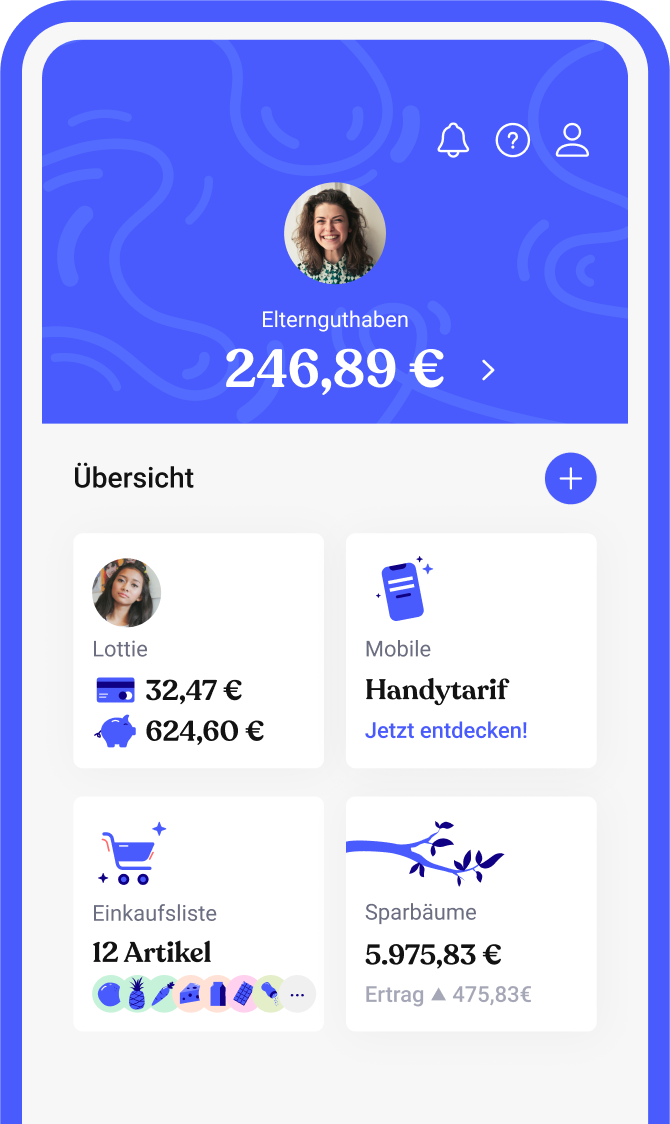


Bling-App laden und direkt starten.
Taschengeld, Investieren, Handytarife und Sparen – die Bling App macht deinen Familienalltag kinderleicht.



Taschengeld, Investieren, Handytarife und Sparen – die Bling App macht deinen Familienalltag kinderleicht.
If you want
Berlin, June 14, 2023 — For young people in particular, every day offers new temptations to spend money: influencers present their clothes, online shops offer bargains, offers and discounts are often just a click away. That is precisely why it is important that young people learn how to handle money independently as early as possible — including digitally.
Mastercard, together with financial startup Bling, conducted a survey with parents and children aged ten to 18 about financial topics and how they handle money. The results of the large family survey clearly show how people deal with finances are changing and how important financial education and practical financial experience are for young people. Just over half of the children and parents even have an overview of what the pocket money is being spent on.
If you want
Practice early: Every fifth child has already shopped online at the age of ten
The online affinity of the new generations is also reflected in their shopping behavior. For example, almost a fifth of the surveyed ten-year-old children and adolescents bought things online alone or with their parents. On average, the first online purchase is made at the age of twelve and a half years. At 13 years of age, more than half (51 percent) already have online shopping experience. For adults, the figure is 85 percent. A third of the children and adolescents surveyed spend their money most frequently online — in web shops or via apps. As a result, half of parents are concerned that their children are unknowingly concluding subscriptions or sales contracts without realizing the consequences.
Parents and kids lack insight: control over their own finances expandable
But do children and young people even have an overview of how they spend their money? Yes, say at least 51 percent of ten to 18-year-olds. It is 56 percent for boys and around 48 percent for girls. Among parents, only 54 percent can understand what their offspring is spending their pocket money on. It is therefore hardly surprising that 32 percent of parents support their children in the event of financial bottlenecks and step in when pocket money is not enough.
Hey, dude!? Cheating for online shopping?
Buy movie tickets for a minute or the latest game? Almost four out of ten of the respondents (38 percent) between the ages of ten and 18 said that they had already used an online payment service and opened an account with incorrect age information. Among 16 and 17-year-olds, it is even more than half. This is of course problematic in some cases. It becomes even more difficult when people shop with their parents' money without their consent and knowledge. After all, 22 percent of the children and adolescents up to 18 years of age surveyed have already done this at least once. Interestingly, almost a third of the parents surveyed say that their children used their payment details and money to order online without asking first. Are these just youthful sins? At least 57 percent of ten to 18-year-olds say that, from their point of view, financial literacy would help to avoid mistakes and make better financial decisions.
If you want
More than half of parents would like financial education to be on the timetable
From a parent's point of view, there is a need for action on many issues relating to money. Three topics should be taught at an early stage: how to deal with finances, from financial planning, budgets to debt (81 percent), professional and income-related topics such as training paths and applications (77 percent), and important everyday knowledge from cost traps to consumer rights (76 percent). Nevertheless, just 56 percent of parents would like financial education to be incorporated into school curricula across Germany. Around a third of the parents surveyed (31 percent) agree that the use of money is already addressed in kindergarten in an age-appropriate way. Just as many respondents are convinced that imparting financial education to students creates more equality and thus better opportunities for everyone.
If you want
Parents with a financial education mandate? Influencers are still ahead of teachers
Financial education at school? False report — usually. In many places, timetables lack content that prepares students for working life and dealing with finances. The majority of parents (81 percent) find it important that children and young people learn how to handle money responsibly. But where should they learn it? For the children and adolescents aged ten to 18 years surveyed, their parents (79 percent) are the most important source of their financial knowledge — and by a large margin. Self-experiment — i.e. classic learning-by-doing — is in second place with 19 percent, followed by Internet research on financial issues with 18 percent. Teachers name just 11 percent as a source of information on financial topics, behind social media influencers with 14 percent. This also confirms the low school relevance of financial education from the students' point of view.
If you want
22 percent of parents have difficulty explaining money topics to their children
The majority of children (70 percent) find that their parents are good at teaching them how to handle money in an understandable way. At least 12 percent of children say that their parents do not explain financial issues well. The parents surveyed, on the other hand, paint a self-critical picture: Of the parents surveyed, just around half (47 percent) say that they are good at teaching their children how to handle money and finances. More than one in five parents (22 percent) feels uncomfortable or even overwhelmed when it comes to imparting financial knowledge and has difficulty communicating financial topics.
If you want
Financial literacy in practice: pocket money with an educational function
More than half of parents (52 percent) see the educational value and relevance of their initial financial experiences in everyday life: For this reason, they pay their offspring pocket money so that their children can practice dealing with personal finances themselves. Mothers (56 percent) see the learning effect even more than fathers (48 percent). The parents surveyed agree on one point: 48 percent give their child pocket money on a fixed day and regularly. Through these reliable payments, parents create a lasting learning effect and enable their children to plan and take responsibility for their own finances for the first time. If you want
If you want
The trend towards digital payments and transfers does not stop at pocket money
32 percent of 10 to 18-year-olds receive their pocket money electronically into their own account; among those over 16 years of age, the figure is as high as 44 percent. Around half of the parents transfer pocket money of over 50 euros to the child's account. This development highlights the increasing importance of digital money and young people's own accounts, even among the very young generation. Special banking apps for families, for example, can help you gain initial (digital) financial experience. They combine educational elements to teach financial literacy with a prepaid card or a debit Mastercard that does not allow debts. 40 percent of parents want more protection for their children and include control functions and subscription blockers among the advantages of special banking apps and cards for children.
Dr. Peter Robejsek, head of Mastercard Germany, explains: “Financial literacy from an early age is not only indispensable in everyday life, it is a question of equal opportunities and participation. The right use of money, whether analog or digital, has a significant impact on life. Financial education enables better decisions, whether in everyday life, at work or when building up wealth — this is important for every individual, but also for us as a society and our prosperity. ”
“The identified gaps in the financial literacy of children and young people require a coordinated effort by all actors — families, schools, politics and business — to close them,” adds Nils Feigenwinter, Founder and CEO of Bling, the financial app for families. “We too hear from tens of thousands of parents that the issue of personal finances can overwhelm them. With bling, we work every day to make families money wise. ”
If you want
Methodology:
For the study commissioned by Mastercard in collaboration with family-fintech Bling, the market research company INNOFACT invited a representative population and surveyed a sample of 1,037 people aged ten to 18 years and 1,039 parents (between 25 and 69 years) of 10 to 18-year-old children. The survey was conducted in the period from 28.04.—04.05.2023.
If you want
About Mastercard:
Mastercard is a global technology company in payments. Our goal is to promote an inclusive, digital economy that benefits everyone and in which secure, simple and smart payments can be made anytime and anywhere. With secure data and networks, strong partnerships, and passion, our innovative products and solutions help individuals, financial institutions, governments, and companies reach their full potential — in more than 210 countries and territories.
If you want
About bling:
Bling was founded in Berlin in 2021. Europe's first family fintech was launched as an allowance app to strengthen the financial literacy of children and young people. Thousands of families now use the Bling app, which is the first independent payment experience for many children and young people.
You can find photos and the Bling logo here
Contact persons for media:
If you want
mastercard
Juliane Schmitz-Engels
Head of Communications Germany and Switzerland
[email protected]
Phone: +49 172 1880720
If you want
Bling
[email protected]
Artem Zhuravlev
Phone: +49-1515-6343098
If you want